Economic governance
Showing 31 to 60 of 87 results

CESR Highlights the Importance of Human Rights to Combat Illicit Financial Flows
The Principles for Human Rights in Fiscal Policy were presented at the 4th Conference on the Right to Development & Illicit Financial Flows from Africa.

Platforming Workers’ Rights in Global Tax Deals
Will the new “global solutions'' being proposed for taxing multinationals align with workers’ rights? In this new post, we analyze the links between global tax deal proposals and the lives of platform workers.

Tax Reforms and Global Redistribution: Situating the Global South
In this commentary piece for Economic & Political Weekly, our Program Officer, Sakshi Rai, argues for an urgent overhaul of the international financial system, as it continues to undermine workers' rights.

Global Minimum Tax: G7 Agreement Lacks in Legitimacy, Fails to Tackle the Root of the Problem
A truly progressive global tax reform must aim for the fair allocation of taxing rights for Global South countries, challenging the colonial foundations of the international financial system and giving all countries an equal seat at the table.
%2014.32.27.png.458x258_q85_box-0%2C64%2C2142%2C1271_crop_detail.png)
Rights Not Debts
CESR contributed to Progressive International's Debt Justice Blueprint, a series of essays that tackle the different dimensions of debt.

When Will the G20 Honor Its Debt to Human Rights?
Last week, we saw a flood of civil society actions and demands that all amount to a similar urgent task: to dismantle and rebuild our current global economic system.

IMF annuals side-event: Changing the rules for a just recovery
On September 30th, CESR's Executive Director, Ignacio Saiz, moderated a panel on "Changing the rules for a just recovery: aligning IMF's work with human rights and fiscal justice in Latin America and he Caribbean".

IMF annuals side-event: The Role of IFIs in a World of Intersecting Conflicts and Crises in the MENA Region
Taking place 5 October 2020, this session will assess IFI's policies in contexts of crises and conflicts, mainly in the MENA Region, by examining the existing policies and their impact on inequality.

Debt Justice Group to IMF: "Defuse Ecuador's Debt Time Bomb!"
A statement on the Progressive International website that was co-drafted by CESR's Allison Corkery, Sergio Chaparro and Ignacio Saiz with partners calls on the IMF to take responsibility for the impact of its disastrous austerity policies on people’s rights.

Austerity is Killing Ecuador. The IMF Must Help End this Disaster
An opinion piece in the Guardian by CESR's Allison Corkery with Andrés Chiriboga-Tejada, Jayati Ghosh, Demba Moussa and Adrian Falco, calls on the IMF to examine the human rights impacts of its loan conditions in Ecuador.

Time for a Rights-Based Global Economic Stimulus to Tackle COVID-19
During this pandemic, economic rescue packages—nationally and globally—must protect the socioeconomic rights of those most at risk.
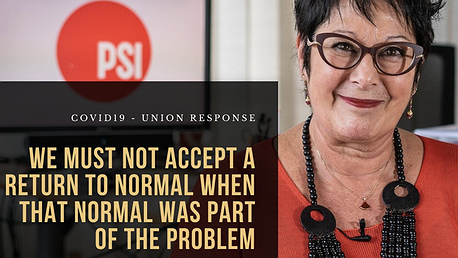
Unions Must Support a Stronger Public COVID-19 Response and a New Global Economy
CESR board member and Public Services International General Secretary Rosa Pavanelli calls for a labor movement response to #COVID19 that boldly demands a new global economy.

A Debt Jubilee to Tackle the COVID-19 Health and Economic Crisis
CESR and over 200 international organizations and regional networks issued a statement calling on the IMF, the World Bank, and members of the G20 to permanently cancel all external sovereign debt payments for 2020.

A Comprehensive Response to COVID-19 Demands Redistributive Fiscal Policies
CESR and partners at the Initiative for Human Rights in Fiscal Policy in Latin America call on States to undertake broad fiscal redistribution in order to avoid dire human rights consequences of the COVID-19 crisis.
CESR's Sergio Chaparro Discusses COVID-19 Debt Relief on International News Network France 24
Chaparro said that while the G20's agreement to suspend debt payments from pooer countries was welcome, it did not go far enough.

Time for a Rights-Based Global Economic Stimulus to Tackle COVID-19
Safeguarding human rights in economic responses to the COVID-19 crisis demands governments finally lay to rest the prevailing dogma of austerity.
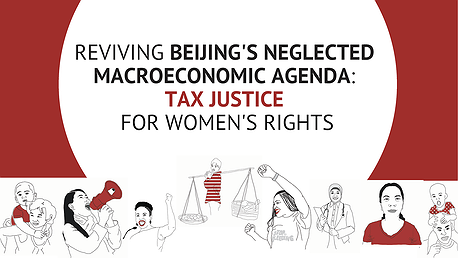
Reviving Beijing's Neglected Macroeconomic Agenda: Tax Justice for Women’s Rights
On March 13, CESR co-sponsors a CSW parallel event on tax justice for women's rights, organized by the Global Alliance for Tax Justice’s tax and gender working group.

Global Protests Demand Human Rights Actors Tackle Economic Injustice
Ignacio Saiz' submission to OpenGlobalRightsArticulo en español
Assessing Austerity's Impacts on Human Lives
CESR's Sergio Chaparro recently lectured about assessing the human impacts of economic austerity policies at The American University in Cairo.

Austerity and the IMF: An Appeal for Responsibility
CESR and partners issued an urgent appeal to the IMF to halt its support for austerity measures and to assess their human rights impacts. We also brought evidence of austerity's unequal impacts to the recent IMF/World Bank Annual meetings.
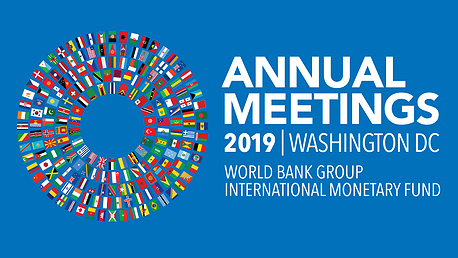
Lessons from Ecuador: Challenging Austerity and Human Rights Erosion at the IMF
CESR will be at the World Bank/IMF Annual Meetings this week, challenging the IMF’s global role in driving austerity measures that result in the steady erosion of human rights in countries such as Ecuador.
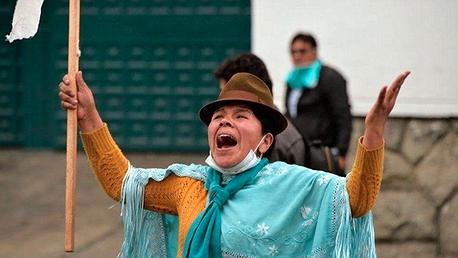
Austerity and Human Rights in Ecuador: An Urgent Appeal to the IMF
Fiscal policy cannot be imposed while ignoring people’s rights, as the Indigenous peoples’ protest movement in Ecuador has shown.
Cutting to the Core: Rethinking the IMF's Way of doing Business to Tackle Gender Inequalities
On Thursday, October 17th at the IMF/World Bank Annual Meetings, this panel discussion asks if the IMF's recent turn to acknowledging gender equality as "macro-critical" has led to meaningfully different outcomes for women affected by Fund-supported macroeconomic policies.
The IMF and Right to Food: Conditionality on Food and Agriculture in the Arab Region
This session on Thursday, October 17th at the IMF/World Bank Annual Meetings will discuss IMF-imposed policies in the Arab Region that impact agricultural policies and achievement of the right to food from regional and national perspectives, as well as propose alternatives.
The IMF and Inequalities: Tensions between Structural Adjustments and Structural Transformations
This discussion on Thursday, October 17th at the World Bank/IMF Annual Meetings debates the balance between IMF-advised structural adjustments and the need for systemic changes in financial governance, to ensure governments can achieve SDG 10 and tackle inequalities on multiple levels.
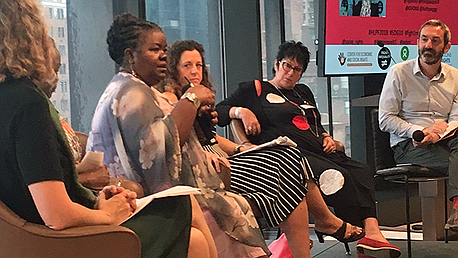
Speaking Truth to Power: Growing the Movement to Fight Inequality
Stark power imbalances are fueling extreme global inequality and cross-movement alliances within civil society are needed to combat the problem.
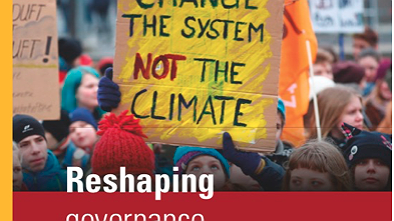
Spotlight on Inequalities at High-Level SDG Forum 2019
The Spotlight on Sustainable Development Report 2019 asserts that successful implementation of the SDGs requires more holistic and more sweeping shifts in how and where power is vested, including through institutional, legal and political commitments to realizing human rights.

Egypt Social Progress Indicators Reveal How Austerity Feeds Gross Inequalities
The Egypt Social Progress Indicators Project finds that IMF-mandated austerity policies are amplifying severe inequalities and undermining the rights to health, education, housing and decent work for millions of Egyptians.
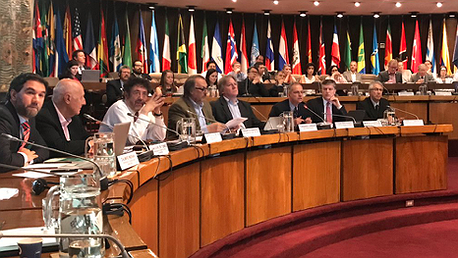
The State of Tax in Latin America: Massive Evasion and Avoidance Block Human Rights and Development
States are obligated to mobilize their maximum available resources to progressively advance rights and reduce disparities between the wealthy and the most disadvantaged.
Highlighting Austerity, Gender and Tax Issues at IMF, World Bank Spring Meetings 2019
In April 2019, Kate Donald (the Director of CESR’s Economic and Social Policy program) attended the IMF/World Bank Spring Meetings in Washington, DC. While there, she shared CESR’s research in several meetings with IMF officials, including work on the relationship between tax policy and gender equality, along with civil society partners and allies.